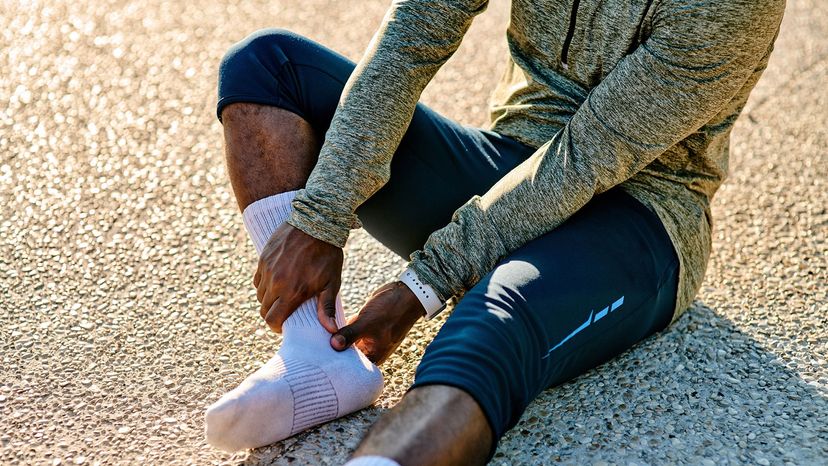 “Should you pop that blister or let it ride? katleho Seisa/Getty Images
“Should you pop that blister or let it ride? katleho Seisa/Getty Images
Work in the yard without gloves or don a stiff new pair of shoes and you’re likely to wind up with an unwanted bodily addition – a blister. There are a bunch of ways to cause a blister, including friction (such as when something repeatedly rubs up against the skin), as well as allergies and exposure to heat, cold and chemicals. These annoying and unsightly bubbles of clear, watery fluid (which is called serum, by the way) might look tempting to pop, but is it a good idea to do it?
Dermatologist Dr. Erum Ilyas, who is based near Philadephia, says she gets that question from patients all the time. "The answer overall is yes," she says via email. "It is reasonable to pop a blister for one big reason: the soreness or tenderness that comes from blisters is from the pressure of the fluid in the blister. Until this pressure is released, it will not have a chance to heal."
She adds that if you don’t pop the blister, it might burst on its own anyway from day-to-day activities. "If this happens in an uncontrolled setting it may put you at a higher risk for infection."
So how do you do it? Follow these simple steps provided by Dr. Peterson Pierre of the Pierre Skin Care Institute in Thousand Oaks, California, to achieve the safest outcome possible:
- Wash the affected area with soap and water.
- Using a sterile needle, safety pin or pair of medical scissors, gently poke the blister. Most of the fluid should leak out easily. If it doesn’t, it’s not ready to be popped.
- Apply soft pressure to ensure that all of the serum is released.
- Dress the area with a pressure bandage to prevent fluid from reaccumulating in the blister. This also protects the skin and helps the area heal.
- Although some doctors recommend applying antibiotic cream, Pierre says to steer clear. "In fact, products like Neosporin can irritate the area, he says via email. "Vaseline or Aquaphor with the bandage is sufficient to provide an environment conducive to rapid healing."
Whatever you do during the popping process and in the delicate days after, do not peel off the outermost thin layer of skin that remains. "When you release the fluid underneath, the tense blister will ‘deflate’ and the overlying blister skin will fall like a parachute into the eroded skin beneath, and act as a natural bandage. A new epidermal layer will grow and fill in underneath," emails Beverly Hills-based dermatologist Dr. Tsippora Shainhouse with SkinSafe Dermatology and Skin Care. For those of you not in the frame of mind to pop, she notes that blisters often resolve on their own, provided you remove "the inducing friction/trauma," meaning for instance, not wearing shoes that caused or irritate the blister.
This advice about popping blisters applies to situations where you know what caused them. "If you are developing blisters and you do not know why, it’s important to see a dermatologist as there are a number of blistering skin diseases that are autoimmune in origin that may need to be managed with other medications to treat and prevent," says Ilyas.
Now That’s Cool
Ever wondered where blister fluid comes from, anyway? When the skin is injured, nearby tissues react by leaking serum, which is intended to act as natural protection for the skin.
Originally Published: Feb 11, 2020
Blisters FAQ
What causes blood blisters?
Blood blisters are not that different than ones that have clear fluid inside of them. Blood blisters are commonly caused by your skin getting pinched (but not breaking open) or when an area of your body is under pressure. This type of blister should be left alone (don’t pop it!) so it can heal, which normally takes about a week or so.
What is the fluid in a blister?
Most blisters are filled with a clear fluid called serum, which comes from nearby tissues that react to a skin injury by leaking as a protective measure.
Is it better to pop a blister or leave it?
In some cases, it can be beneficial to pop a blister to reduce the tenderness that comes from the pressure of the fluid inside it. This will allow the skin to heal. However, do not peel or pick the outermost thin layer of skin that remains after popping the blister. It acts as a protective barrier as the skin underneath heals.
When is it okay to pop a blister?
You can pop a blister if you know what caused it (and it’s not a blood or burn blister). But if you’re developing blisters and you do not know why, it’s important to see your doctor or dermatologist to see if there is an underlying issue, such as an autoimmune disorder.
How do you treat a burn blister?
First, resist any temptation and do not pop a burn blister. If it’s minor, you can treat it at home. Put the burned area under cool running water or apply a cool, wet compress for about three minutes. Carefully wash the area with antibacterial soap and water and pat dry with a clean cloth. Then, apply a generous amount of topical antibiotic to the blister before covering it with gauze. Re-wash the area, apply new ointment, and change the bandage every 24 hours. If the pain is still extreme after a few days of doing this, drain the blister fluid using an alcohol-sterilized needle and apply ointment and a new bandage.



























